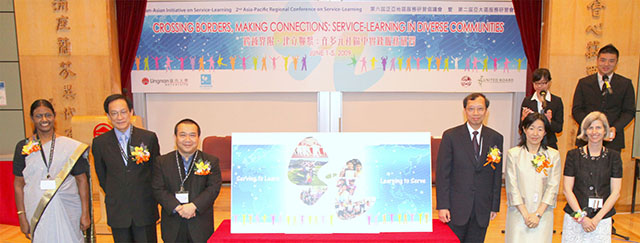Start Date
1-6-2009 3:20 PM
End Date
1-6-2009 3:35 PM
Description
The importance of scientific knowledge and technology in daily life is duly emphasized in the reformed curriculum. Also, the mode of learning and teaching is to change from teacher-centered approach to cooperative approach. ‘Learning-by- doing’ and ‘cooperative-learning’ are considered as effective means to learn. Being a pioneer in science and technology education, the researcher’s school organizes workshops for primary students and their families across the Territories each year. In the workshop held last November, secondary students who acted as facilitators, practiced their ‘generic skills’ whilst the primary students and their parents ‘constructed’ knowledge and consequently ‘valued’ their family activities. The present study is a report on the effects of the facilitators in the performance of the heterogeneous working groups formed in the workshop. It indicates that the service recipients have attained higher learning levels and achieved better performance. In subsequent survey, it confirms the service-providers benefited from other learning experiences outside their classrooms.
Recommended Citation
Li, S. S. (2009, June). The effects of a facilitator in the performance of a heterogeneous working group: A service-learning exploration in technology education. Paper presented at the 2nd Asia-Pacific Regional Conference on Service-Learning: Crossing borders, Making Connections: Service-Learning in Diverse Communities, Hong Kong and Guangzhou, China.
Included in
The effects of a facilitator in the performance of a heterogeneous working group : a service-learning exploration in technology education
The importance of scientific knowledge and technology in daily life is duly emphasized in the reformed curriculum. Also, the mode of learning and teaching is to change from teacher-centered approach to cooperative approach. ‘Learning-by- doing’ and ‘cooperative-learning’ are considered as effective means to learn. Being a pioneer in science and technology education, the researcher’s school organizes workshops for primary students and their families across the Territories each year. In the workshop held last November, secondary students who acted as facilitators, practiced their ‘generic skills’ whilst the primary students and their parents ‘constructed’ knowledge and consequently ‘valued’ their family activities. The present study is a report on the effects of the facilitators in the performance of the heterogeneous working groups formed in the workshop. It indicates that the service recipients have attained higher learning levels and achieved better performance. In subsequent survey, it confirms the service-providers benefited from other learning experiences outside their classrooms.
